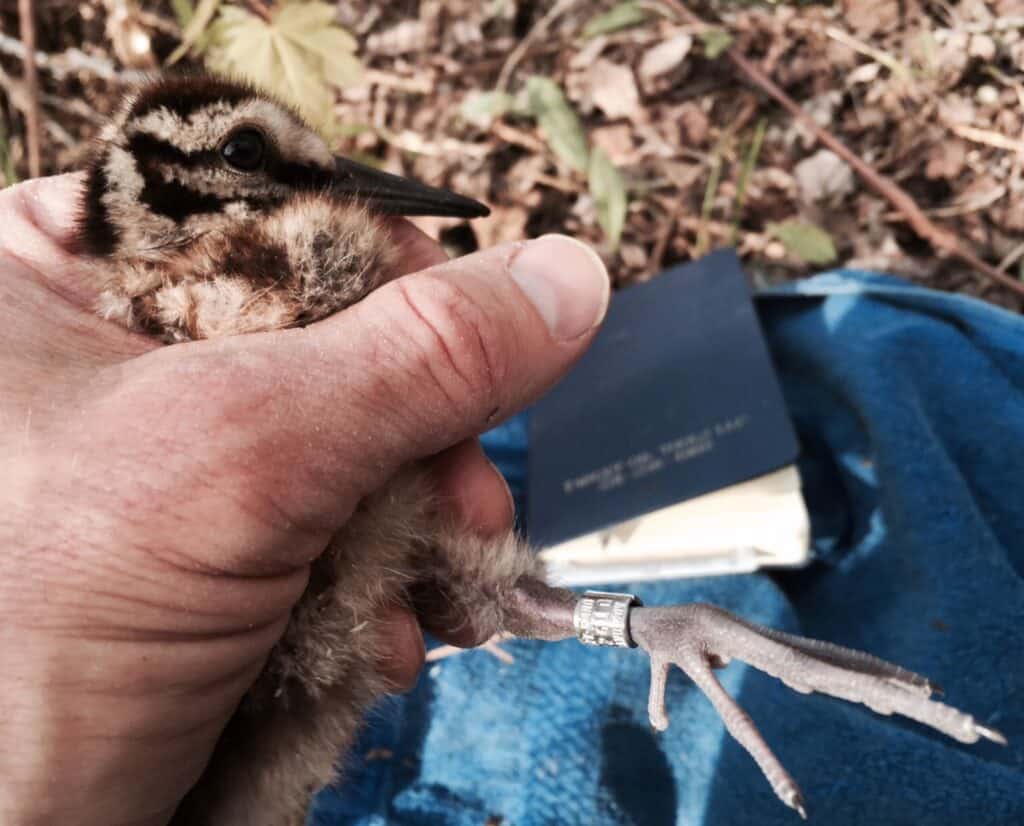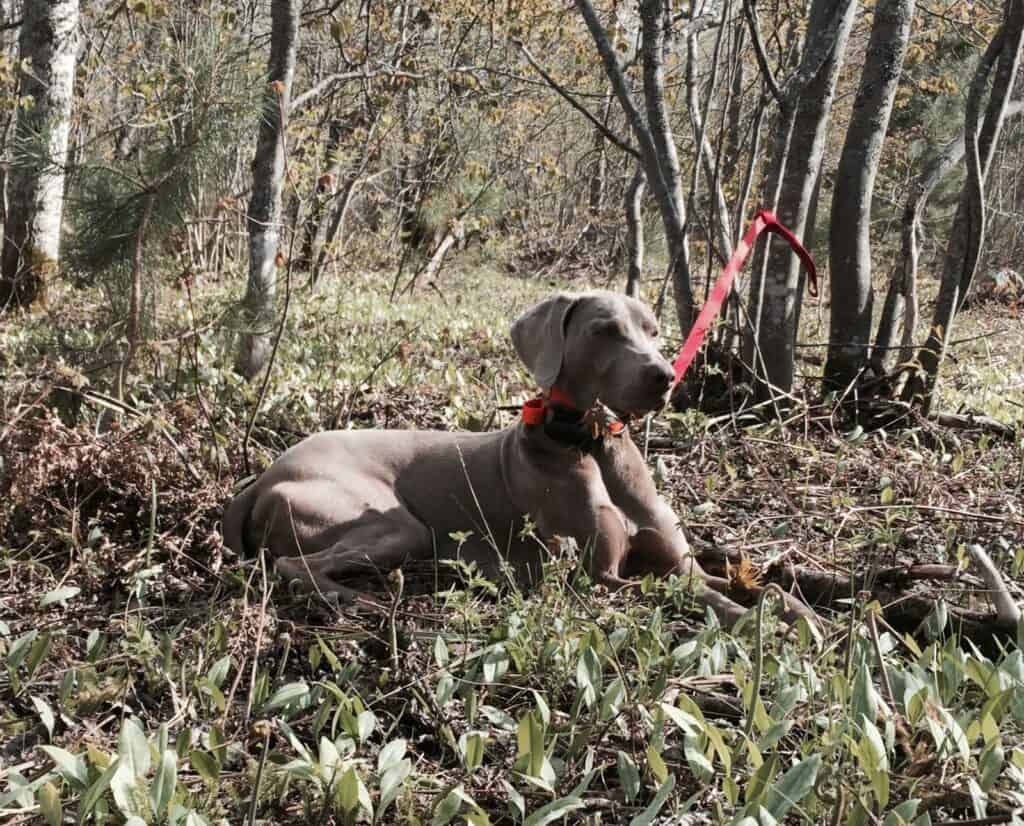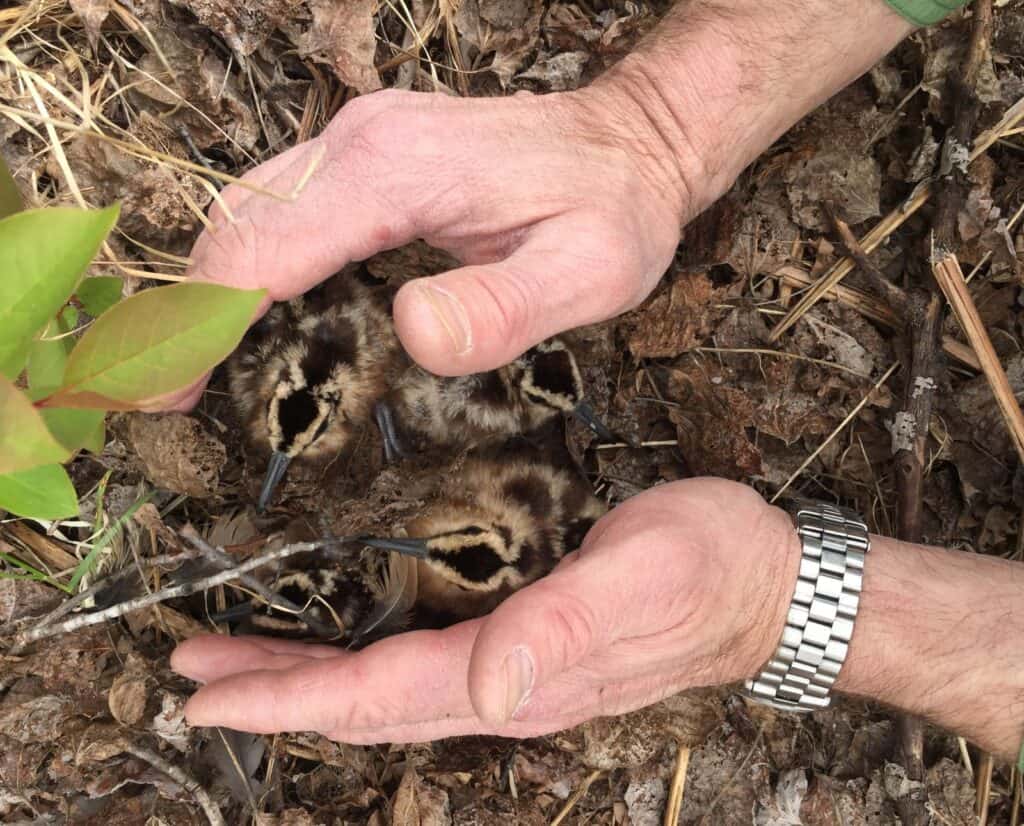Banding American woodcock in Northern Decrease Michigan wouldn’t be possible with out the assistance of pointing canine.
This text initially appeared in Searching Canine Confidential, Quantity 5. The Michigan Woodcock Banding Program is permitted by the Michigan DNR-Wildlife Division and the USGS-Fowl Banding Laboratory to seize and band woodcock.
On a vibrant April morning in northern Michigan, a loyal uplander embarks upon a spring ritual along with his proofed Weimaraner. Tender, damp leaves give approach below his bootsteps because the silver canine works the budding hardwood forest earlier than him. Instantly, the big canine halts, his muscle tissue frozen with the isometric strain required to level. He holds regular, permitting his handler to stroll up beside him.
The person is searching for a hen American woodcock holding tight in entrance of his pointing canine. After scouring the bottom for the extremely camouflaged chook, he spots her completely nonetheless physique within the leaf litter close to a brief, naked seedling. He leashes his canine, heels the Weimaraner away, and ties him to a close-by tree. Then, he removes an expandable fishing web from his pack and returns to the hen. The hen is collected gently and positioned in a tender, zippered mesh bag.
Then, he begins searching for the extremely hid chicks. With our bodies the dimensions of cotton balls adorned with downy feathers meant to imitate fallen leaves, American woodcock chicks are extremely troublesome to find. In the course of the search, he takes sluggish, cautious steps, taking the utmost warning to not step on a fragile chick.
There! He spots one. The person drops a metallic washer with sizzling pink tape wrapped round it subsequent to the tiny, immobile chook to mark its location. There’s one other! He units down one other chip. There are 4 chicks in whole; this hen laid a wonderfully common clutch measurement. After the entire chicks are positioned, he begins gathering the small birds by hand. The primary chick to be captured peeps out a warning, and the remaining chicks on the bottom start darting in each course. The person does his finest to shortly, safely, quietly, nab every chick and reunite them in their very own mesh garment bag.
He returns to his gear pile and the trapped hen. The leashed canine provides him a curious look as he removes banding pliers and 5 minuscule leg bands from his pack. He bands the hen first as a result of she’s been held captive for the longest, then releases her.* Then, he suits every chick with their very own leg band. After each chook is outfitted with a brand new piece of bijou, they’re clustered collectively on the bottom. Along with his fingers positioned over the gathered chicks, the person simulates a hen’s flush after which shortly leaves the chicks to await the hen’s return.
He releases the canine from the tree. As soon as the pair is a protected distance away from the woodcock household, the canine is unleashed and inspired to seek for one other unsuspecting brood.
This man’s title is Invoice Quinlan. He’s a permitted woodcock bander in Michigan. Every spring, he takes his most dependable and expert chook canine into the woods looking for woodcock. Previous to being a bander, Quinlan utilized early spring days previous to the nesting quiet interval to coach his canine on grouse and returning flight birds. He’d take his pups into locations the place the snow recedes first, climbing down open areas and utility strains to work cowl.
He loves being within the woods this time of the 12 months as a result of the bushes haven’t any leaves. Air and scent journey freely by way of these often dense, wooded areas, making it simpler for canine’ noses to select up chook scent.
These springtime treks bought Quinlan enthusiastic about woodcock banding.

Changing into A Permitted Woodcock Bander in Michigan
“Considering about these birds and their migration, habits, and sky dances bought me enthusiastic about how I’d apply my pursuit of upland canine coaching to assist assist with the viability of the American woodcock,” mentioned Quinlan. “As such, I made a decision I needed to pursue banding woodcock.” Fortunately, he knew somebody in his northern Michigan NAVHDA chapter who was a permitted bander. Quinlan apprenticed with him for 2 seasons earlier than being formally permitted by way of Michigan’s banding program himself.
After Quinlan determined he needed to be a bander, he wanted to get his canine as much as snuff, too. “It’s completely a requirement to have a gradual canine to have interaction in woodcock banding. As an apprentice, your canine must be judged by your mentor. To be a believable woodcock banding canine, your canine have to be regular within the presence of recreation,” mentioned Quinlan. “At a minimal, I would like my canine to be regular by way of flush, ideally by way of shot.”
As soon as you’re a licensed bander, you might be chargeable for judging whether or not your personal canine is prepared. In case your canine would possibly break on a hen or chick, he have to be stored out of the nesting woods till the correct stage of steadiness is attained by way of additional coaching. “In case your canine is regular to shot, he’s a stage or so past what shall be encountered throughout banding,” mentioned Quinlan.
Canine Used For Banding Woodcock Should Meet Sure Requirements
Quinlan’s aim is to coach for NAVHDA Prize I utility canine. He’s discovered that NAVHDA’s utility coaching is the flagship program for creating nice versatile canine. “I discovered it so helpful when it comes to my looking and coaching versatile canine just like the Weimaraner,” mentioned Quinlan. This rigorous coaching program helps Quinlan’s canine carry out above and past what’s required of the minimal woodcock banding requirements.
Clearly, Quinlan isn’t doing any springtime looking, however he helps reinforce the steady-to-shot expectation throughout early spring coaching by packing alongside a clean handgun and clean rounds. Earlier than Michigan’s nesting quiet interval begins, he tunes up Panzer, his oldest Weimaraner, by coaching him on ruffed grouse and returning woodcock flight birds. That approach, Panzer is reacquainted with Quinlan’s expectations and is mentally prepared to assist him band woodcock chicks come late April.


It’s simple to see how woodcock banding is a process reserved for well-trained and regular pointing canine. American woodcock chicks are extremely small and simply crushed; a canine which will step on a chick or, heaven forbid, catch one has no place pointing broods. As a substitute, banding is reserved for proofed canine who will be trusted, and whose experience is unquestionable. For instance, Panzer’s son, Rogue, is Quinlan’s pet in coaching. Rogue isn’t fairly prepared to assist band woodcock but, but when he’s something like his father, he shall be earlier than Quinlan is aware of it.
Woodcock Banding Would Be Almost Unimaginable With out Canine
Arguably, pointing canine are required to efficiently conduct woodcock banding initiatives. Whereas it’s not unattainable to stumble throughout broods alone, canine are invaluable companions when making an attempt to find camouflaged hens and chicks.
“Canine are the technique of discovering birds. They’re indispensable,” mentioned Quinlan.
Whenever you get all the way down to the meat of what makes a very good woodcock banding canine, those self same traits are precisely what makes a very good upland looking canine. “At the start is prey drive,” mentioned Quinlan. Sniffing out hens and broods is a discovering recreation to looking canine, and banding canine have to be pushed to find woodcock. “A canine that’s clever on looking cowl utilizing the wind, has a drive that will get him out and away, and is regular if you attain him can be an incredible banding canine,” he mentioned.


Banding Woodcock Helps Biologists Perceive These Birds
When you’re seeking to spend extra of spring within the woods, contemplate turning into a permitted woodcock bander. A number of states have obtained a grasp allow from the U.S. Fish and Wildlife Service to conduct woodcock banding initiatives. These states are allowed to sub-permit non-public residents to band woodcock on their very own. States that achieve this have contributed to a wealth of information relating to woodcock populations, behaviors, and actions.
“The info generated from this work is used to make choices on bag limits, looking season durations, and extra,” mentioned Quinlan. The info Quinlan is speaking about contains brood measurement, approximate age, and GPS location.
“Fowl banding started within the late 1800s as a approach of amassing information about age, intercourse, survival, and spatial distribution of migratory recreation birds,” writes Bailey Petersen, an assistant wildlife space supervisor with the Minnesota DNR. “When a band is reported to the U.S. Geological Survey’s Fowl Banding Laboratory in Maryland, this system is ready to see the place the chook was harvested or recaptured in relation to the place it was initially caught. Further information collected throughout banding, equivalent to age and intercourse, can be utilized to find out variations in migration patterns and survival amongst cohorts in addition to the present age of the chook.”
Woodcock Banding Is A Half Of Michigan’s Tradition
In keeping with the Michigan DNR’s “Ruffed Grouse And American Woodcock Standing In Michigan, 2019,” 74 Michigan banders spent 2,052 hours within the subject and banded 1,110 woodcock chicks. Impressively, since 1981, Michigan has out-banded all different states and Canada by 40,000 birds.
Michigan has a sturdy banding tradition for a very good purpose: Dr. Andy Amman. Amman, a famend ruffed grouse and American woodcock researcher, started banding woodcock with canine within the Sixties. After utilizing English Pointers, English Setters, and Brittanys to develop his strategies, he printed a e book with The Ruffed Grouse Society in 1981 titled A Information to Capturing and Banding American Woodcock Utilizing Pointing Canine. Inside are remarks concerning the wonders of working with chook canine, use specialised pliers to open and shut leg bands, and particulars on dealing with woodcock chicks.
Amman’s mannequin for utilizing a pointing canine to find woodcock hens and chicks flourished. At this time, the 34-page information influenced the strategies for Michigan’s, Minnesota’s, and Wisconsin’s state-run woodcock banding packages.


Woodcock Populations Are Declining
The Michigan DNR is conscious that woodcock populations are declining. Probably the most important trigger is probably going as a result of a lower in high quality habitat. “Ruffed Grouse And American Woodcock Standing In Michigan, 2019” states, “Sport inhabitants surveys have indicated woodcock populations are at the moment amongst their lowest recorded ranges for the reason that Sixties.” That mentioned, “federal surveys present that Michigan continues to be the primary state within the nation for American woodcock harvest and one of many prime manufacturing states.”
The U.S. Fish and Wildlife Service’s “American Woodcock Inhabitants Standing, 2023” by Mark Seamans and Rebecca Rau got here to comparable conclusions. In keeping with its authors, Central Area woodcock are declining at a charge of 1.25 p.c yearly. In addition they discovered that the area’s 2022 recruitment charge index was 18.2 p.c lower than the 2021 index. In 2022, there have been just one.23 immature woodcock for each grownup feminine.
Lack of habitat high quality is probably going a major reason behind woodcock inhabitants declines. As human developments develop, fires are suppressed, and forests are permitted to develop into older age lessons, younger and disturbed forests have gotten more durable to come back by. Woodcock depend on these early successional habitats for meals and canopy.
Woodcock analysis using a variety of strategies, and specializing in all woodcock, together with females and chicks, is critical to assist managers key in on what will be carried out to have probably the most affect on woodcock populations. Banders are at a singular benefit as a result of they will use chook canine to find nesting females and broods. Banders can present beneficial info by way of their efforts and might assist in different types of analysis, equivalent to radio telemetry and habitat evaluation.
Develop into A Woodcock Bander, Volunteer With Your State Wildlife Company
It’s price noting that whereas Wisconsin, Minnesota, and Louisiana could also be searching for extra woodcock banders, Michigan is basically tapped out. The Michigan DNR acknowledged they have already got a surplus of banders. Earlier than turning into a woodcock bander, it’s beneficial that you just give your state company a name and see if they may use extra assist.
When you do determine to volunteer together with your state wildlife company, then you definately, like Quinlan, can use these springtime adventures to study extra about woodcock habitat and the place to pay attention your looking efforts within the fall. “Spring is a good time to be within the woods,” mentioned Quinlan. “I at all times use spring as a chance to get again into canine coaching for the 12 months. As quickly as we are able to get out into the duvet within the areas we are able to hunt, we do.”
“Those that use well-trained pointing canine looking for broods will derive appreciable pleasure from watching their canine work,” Dr. Amman writes. “Moreover, the bander shall be captivated by the antics of the hen and her chicks and the entire different issues he’ll uncover for himself about these fascinating birds.” Ask any woodcock bander about why they do what they do, and I’m sure they’ll echo Dr. Amman’s and Quinlan’s remarks.
*As of March 31, 2024, banders in Michigan not band hen woodcock to scale back the quantity of stress they endure throughout the brood rearing season.
Learn Extra
Understanding the Fall Woodcock Migration
Your Canine Can Volunteer for Conservation with Your State Company
Via the Timber – A Undertaking Upland Unique Movie
Woodcock Taking pictures – Edmund Davis’ 1908 Basic in Audio Format














